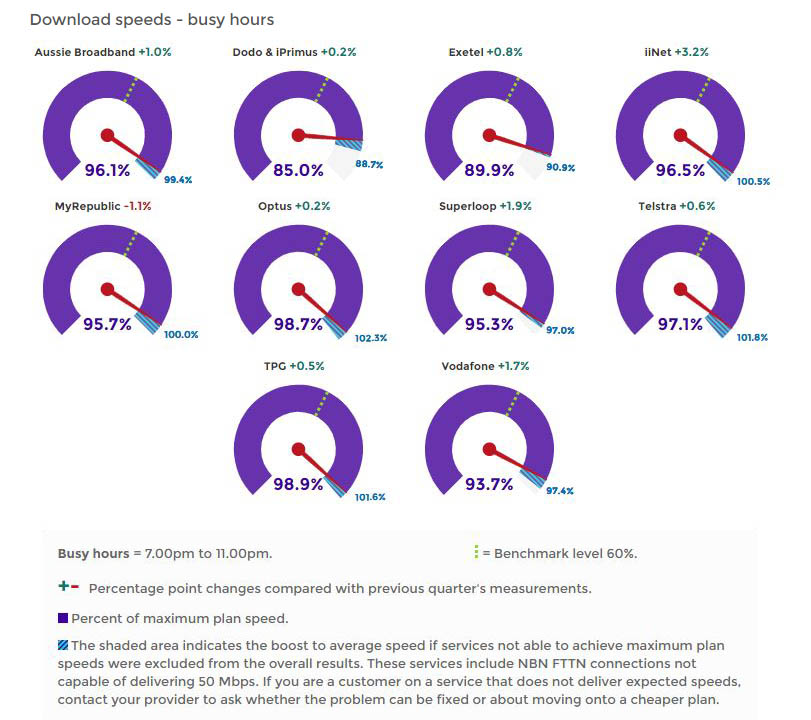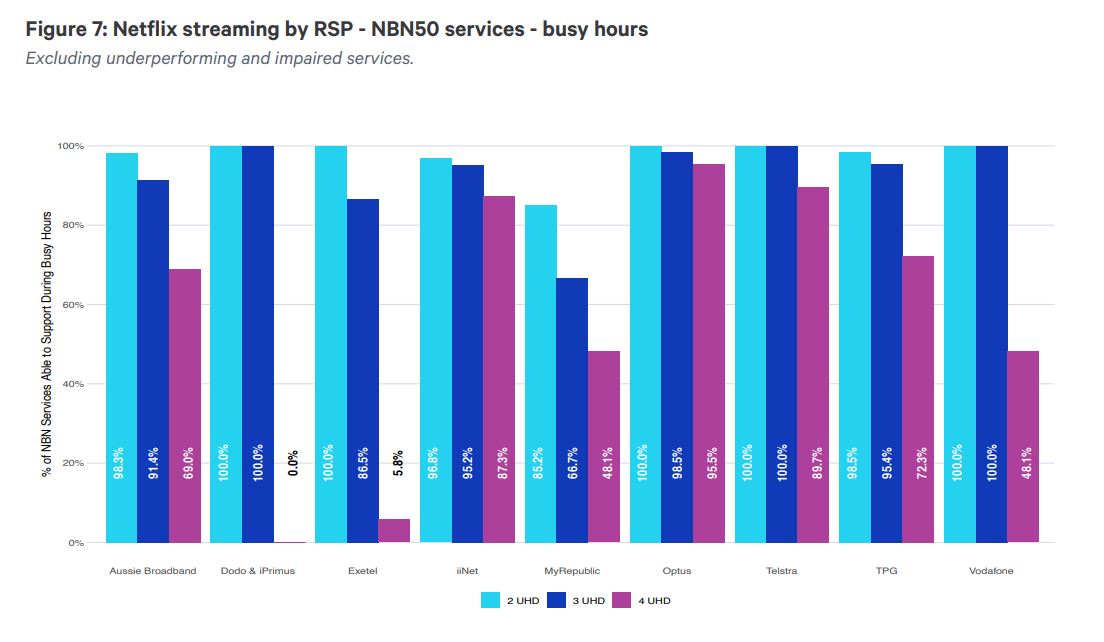The Australian Competition and Consumer Commission (ACCC) has released its new report on NBN speeds and performance, the first for 2021 and 12th quarterly report to date. Analysing the average download, upload and streaming-specific speeds of major Australian NBN providers in December of 2020, the latest Measuring Broadband Australia Report marks the first time since November 2019 that Optus hasn’t come out on top – meaning a new provider is now officially the ACCC’s best-performing.
Former ACCC darling TPG has finally reclaimed its spot as the fastest average provider for download speeds, beating out Optus by just 0.2%. This is the first time TPG has taken the number-one spot since August 2019, when it dominated average download speeds for four consecutive quarters before being dethroned by Optus in November of that year.
The ACCC report looks at both download and upload speeds, as well as the average video streaming performance of each included provider. Continuing the trend established in the ACCC’s previous report in December last year, peak hour speeds remain strong, while multiple high-definition video streams are now supported across even slower-tier NBN plans.
Fastest download speeds: TPG reclaims top spot
The report covers the results of more than 232,500 download speed tests conducted to fixed-line NBN services from 11 providers – namely Telstra, Optus, TPG, Aussie Broadband, iiNet, Vodafone, MyRepublic, Dodo and iPrimus, Exetel, and Superloop. Average speeds for the December test period are calculated as a percentage of maximum possible speed achievable on each plan during the peak traffic time of 7pm-11pm; the higher the percentage score achieved by a telco, the faster on average that telco performed during busy hours.
After playing second fiddle to Optus for the past five reports, TPG is back on top, achieving an average peak-hour download speed of 98.9% of the maximum speed available. Admittedly, this is only slightly ahead of Optus, which logged 98.7%, however both providers increased their speeds when compared to last quarter.
The full download speed results are:
- TPG: 98.9%
- Optus: 98.7%
- Telstra: 97.1%
- iiNet: 96.5%
- Aussie Broadband: 96.1%
- MyRepublic: 95.7%
- Superloop: 95.3%
- Vodafone: 93.7%
- Exetel: 89.9%
- Dodo & iPrimus: 85%
If you’re interested in plans from this report’s included providers, we’ve listed several below. The following table shows a selection of published unlimited Standard Plus Evening Speed (NBN 50) plans from Canstar Blue’s database, listed in order of their cost, from the lowest to highest and then by data allowance, largest to smallest. Use our comparison tool to see plans from a range of other providers. This is a selection of products with links to a referral partner.
In third place was Telstra, with an impressive 97.1%, followed by iiNet with 96.5%, and Aussie Broadband at 96.1%. Overall, almost every provider demonstrated an improvement in download speeds since the ACCC’s December report, with only MyRepublic showing a slight decline in performance. Likewise, all providers averaged speed of well over 90% of the maximum, with the exception of Exetel, Dodo and iPrimus.

Fastest Netflix streaming speeds
A recently-introduced metric, the ACCC now looks at how each provider’s plans handle simultaneous high-definition Netflix streams during the 7pm-11pm peak period. The ACCC records the ability of each telco to reliably deliver up to four ultra HD streams on a single connection, with results indicating the percentage of tests that were able to support multiple uninterrupted streams. In great news for Netflix binge-watchers, all major NBN speed tiers can now theoretically stream four HD programs simultaneously, with most NBN 50 plans and all NBN 100 plans also able to support three or more Ultra HD streams.
Looking at NBN 50 connections, Dodo, iPrimus, Exetel, Optus, Telstra and Vodafone were each able to support two Ultra HD streams in 100% of tests, with Dodo, iPrimus, Telstra and Vodafone achieving a perfect score for three simultaneous streams. Keep in mind that the below graph references Ultra HD streams, and on a NBN 50 connection; if you’re on a faster NBN plan, or just want to watch in standard HD, you’ll achieve a much more consistent performance with each provider.

Fastest upload speeds
The ACCC also measured average peak-hour upload speeds, which are worth considering if you’re looking for a plan for frequent video calling or uploading large files. Again, Exetel showed the fastest consistent speeds, scoring 90.1% on average, followed by MyRepublic and Vodafone (86.7% each), TPG (86.5%) and Superloop (86.4%).
The full upload speed results are:
- Exetel: 90.1%
- MyRepublic: 86.7%
- Vodafone: 86.7%
- TPG: 86.5%
- Superloop: 86.4%
- Dodo & iPrimus: 86%
- iiNet: 85.1%
- Optus: 83.9%
- Telstra: 83.4%
- Aussie Broadband: 81.6%
ACCC: NBN speeds improving, streaming better than ever
In general, NBN speeds remain strong, even as providers ease the temporary bandwidth expansions implemented during the height of the 2020 COVID-19 pandemic. The number of underperforming connections in quarterly testing continues to decline, with only 7.7% of consumers experiencing speeds far below the maximum available on their specific plan.
“We encourage both NBN Co and retail service providers to help consumers on connections that do not perform to their plan speed,” said ACCC Commissioner Anna Brakey. “In many cases, these limited speeds are caused by modem or in-home wiring issues and can be fixed with a visit from a technician, or by moving consumers to lower and less expensive speed plans to ensure they receive the speeds they pay for.”
Streaming speeds and consistency has also improved, which can be attributed to changes made by Netflix to enable users to stream higher quality video at a lower data rate. Considering how popular video streaming is among Australian households, it’s great news for customers on fixed-line connections, especially in larger homes where plans need to support multiple simultaneous streams.


Share this article